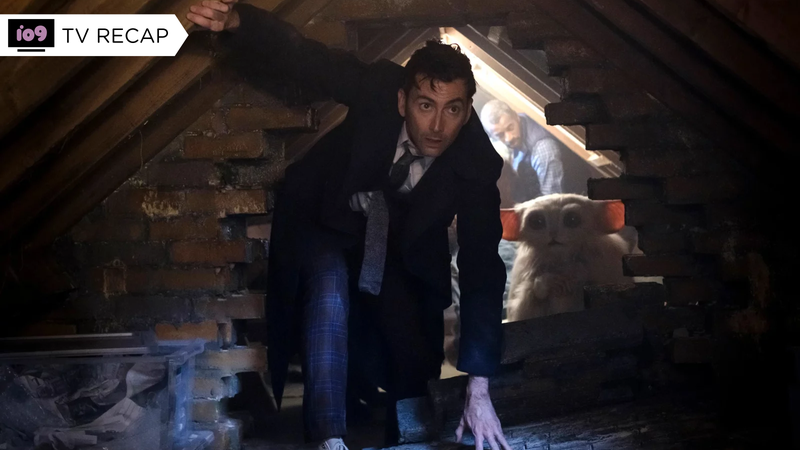
Human drama suffused with alien weirdness? A shotgun blast of emotional sincerity to sweep you away from barely coherent sci-fi technobabble? The power of love, specifically encapsulating queer love? David Tennant and Catherine Tate running around the place having the time of their lives? Do not adjust your clocks friends: it is indeed 2023 rather than 2008. But for one November night, Doctor Who certainly made it feel that way.

“The Star Beast,” the first in a series of three Doctor Who specials airing for its 60th anniversary over the next few weeks, certainly looks modern. Even compared to Doctor Who’s recent output, it’s clear that there’s a good chunk of money behind the show’s new era, from whizzbang monster puppetry and special effects work, to slick new titles and massive sets that regularly poke at the back of your mind that somewhere out there in the Magic Kingdom someone is footing a part of the bill. But it is, for all intents and purpose, a very specific kind of nostalgic throwback befitting an anniversary celebration—not one, perhaps, that goes all the way back to Doctor Who’s earliest days. Not even one, like the show’s last big anniversary celebration a decade ago in “The Day of The Doctor,” that goes back to the beginning of the show’s revived era, and the weight of all its context. No, instead, “The Star Beast” is about a very specific kind of vibe: remember when it felt like the world really liked Doctor Who in 2008?
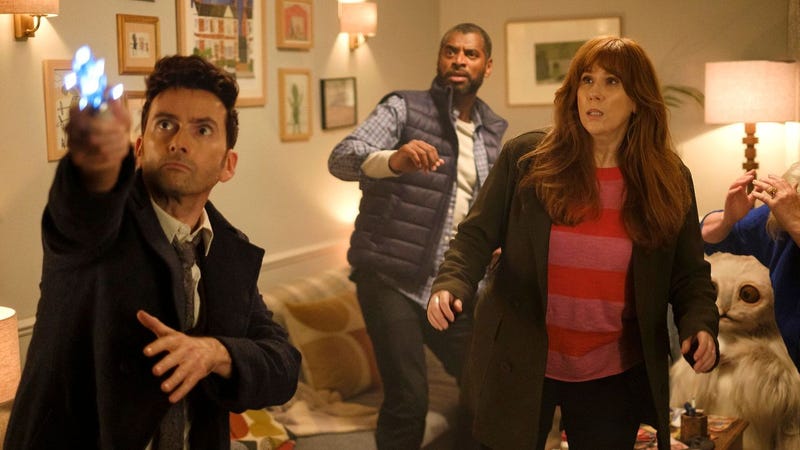
The series certainly has been on a long journey since then—for as much as the show was reaching the apex of its renewed popularity in 2008 at home in the UK, it’s arguable that it really didn’t become more of a truly international sensation again until the beginning of Steven Moffat’s tenure as showrunner, alongside Matt Smith’s Eleventh Doctor. And even more recently, as the series has weathered reshuffled schedules, uneven stories, and a declining interest, the idea of a holistic attempt to return Doctor Who to that kind of former status makes sense, even if no one expected it would come in the form of the BBC quite literally trying to recapture 2008 with not just the return of showrunner Russell T. Davies, but stars David Tennant and Catherine Tate.
But the thing about Doctor Who is that, even for a show with the premise that it could go anywhere or anywhen, and be anything, time does indeed march on. Things change, people change, its hero literally changes every few years. Even if, in the story, you can flip a few levers on the TARDIS console and go back to a moment in time, metatextually you can’t just go back. And why would you really want to, when it’s more interesting to revisit a moment in time and explore the impact it has had years after the fact? That’s where we are coming into “The Star Beast”—the same, but different. David Tennant is here, but he’s not the Tenth Doctor, he’s a new incarnation, uncertain of why this face is back, but also a very different person than the Time Lord we last saw him as over a decade ago. Catherine Tate is here too, but Donna Noble has been through a lot even beyond the context of her tragic exit in “Journey’s End,” her memories of the Doctor wiped to save her life after she became suffused with the mind of a Time Lord. And so, here we are with that question again: what does it mean to return to these characters, this face in the Doctor’s case, 15 years later?
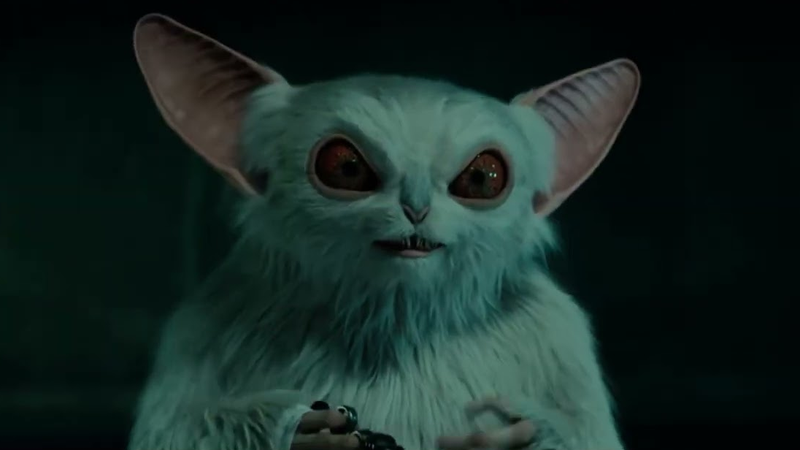
The answer isn’t even really an answer. “The Star Beast” plays around with this question a lot; it leaves its true answers off the board for now. It’s not a typical first story for a Doctor—the Fourteenth Doctor enters the scene with all the confidence of a Time Lord who has been around for a while, there’s no post-regenerative trauma to unpack here, the ball gets rolling immediately as he bumps back into Donna Noble’s life, meets her intriguingly named teen daughter Rose (Heartstopper’s Yasmin Finney in a delightful turn) and a spaceship comes crashing down over London just as quickly. There’s no explanation why he has a new sonic screwdriver that can create transportable shield walls or project its own computer screens; at the episode’s climax, there’s no explanation as to why the TARDIS has redeveloped its console room into a giant, stark new look, full of bright whites, gangways to race around on, and color-changing round things a-go-go (what are the round things? no idea, but we love them). The question of who the Fourteenth Doctor is, and why he has the face of the Tenth, is punted down the line. “The Star Beast” is instead largely about Donna, the resolution of her story, and, in true Doctor Who style, wrapping that up in a very camp alien romp starring a fuzzy, adorable terror named the Meep (Miriam Margolyes, in perhaps the voice acting performance of the year, or at least the most fun one).
For the layers of context it has to dance around—to the point of opening with a very awkward recap of the Doctor and Donna’s history delivered by Tennant standing on what almost looks like a video game character creation screen—“The Star Beast” is at its core about this simple, silly little adventure. Based on the classic Doctor Who Weekly comic story by Pat Mills and Dave Gibbons of the same name, the episode sees the aforementioned crashed spaceship bring the Meep into Donna and Rose’s back garden, where the latter tries (and fails) to keep the seemingly sweet creature safe from the threat of the Wrarth Warriors, insectoid aliens that have come to hunt the Meep down. There’s shootouts between UNIT and aliens on London suburb streets, explosions, a taxi getaway, it’s all action and silly fun. Although the grim specter of Donna’s cruel fate lingers in the background—amplified by the anxiety of her mother Sylvia, as the weirder things get and the more the Doctor re-intersects with their lives, the more fearful for Donna’s life she becomes—the story is, at least for the most part, largely about this bizarre, fluffy adventure starring bug policemen and a furry Baby Yoda on cuteness steroids.
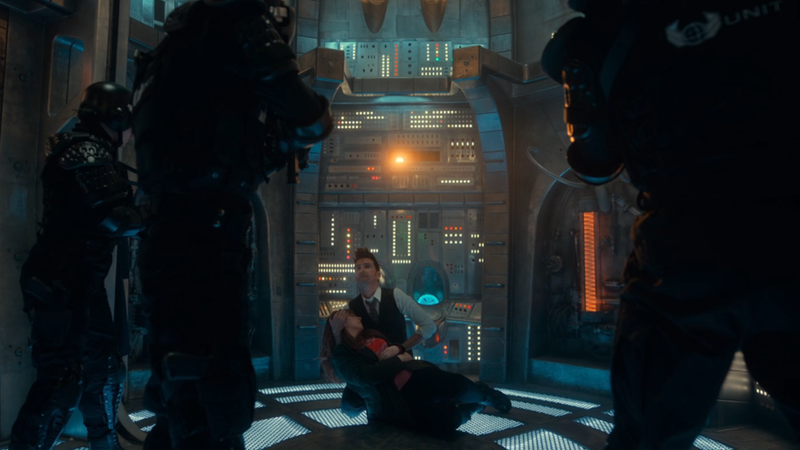
It’s only when things turn (the Meep is far from as cute as it first seems, and is in fact the sinister architect of all this mayhem) and the day needs to be saved that “The Star Beast” really starts to sit down and engage with its layers of meaning and context for its characters, especially Donna. When the Doctor realizes the only way he can stop the Meep’s plan to level London in its escape is to get help from someone else on his level—to, Winter Soldier style, undo Donna’s mental blocks and reconnect her to the Time Lord mind she absorbed all those years ago and face certain death—it hinges on just how much both the Time Lord and Donna have changed in their 15 years apart. The Doctor has literally been several other people, including, as it will become crucial, a female-presenting person up until very recently, and the incarnation he finds himself as now is one incapable of, or unwilling to, bottle away the emotions he feels and the love he has for the people in his orbit. Donna, meanwhile has become a mother, and albeit it’s still one in her brusque, mouthy manner—hell hath no fury as a Donna Noble descending on someone threatening her family—it has seen her amplify her best characteristics beyond all the bluster and the shouting, her selflessness, her willingness to stand up for what’s right, and above all, a desire to see that there’s never a need to give up and embrace despair when you can hope for something good.
It is in this crucible of overwhelming feeling—trapped in the tiny, bisected bowels of the Meep’s ship as it threatens to ascend to the stars and sunder London with it—that “The Star Beast” chooses to let its emotional stakes take priority over its rational ones. The Meep is stopped by the Doctor and the Doctor-Donna in a climax of technobabble, because stopping the Meep never really mattered: it was about the cost of Donna’s seeming sacrifice, and then, through the power of her daughter, those years of tragedy at last being undone, swept away so that Donna Noble can be the Doctor’s best friend in the universe for at least a little while longer. It’s a moment of profound love, and especially of queer love, when the Doctor’s own genderfluid past and Rose’s trans identity becomes the catalyst for saving her mother, their genetic link sharing the stress of Donna’s blocked Time Lord memories long enough to see her not just survive remembering, but choose to simply let them go, and be her whole self again.
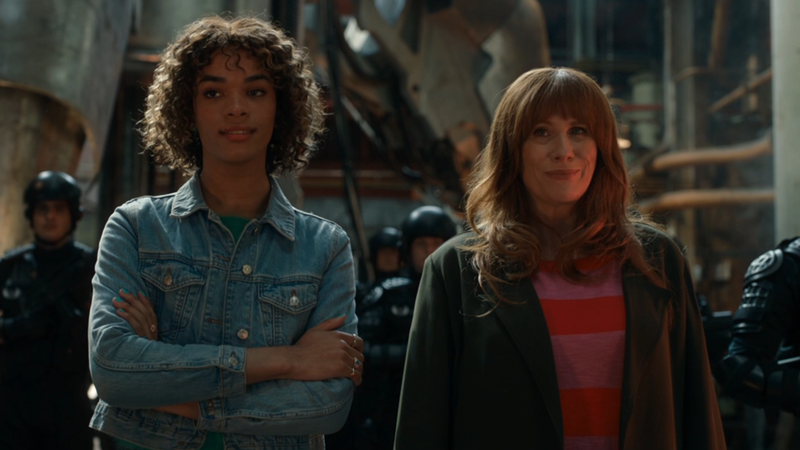
A lot of it barely makes sense, and, while earnest, the show’s use of nonbinary identity as part of this plot twist is far from a perfect representation of transness (but still an incredibly important one to center in this moment, given the western world’s, and the UK’s in particular, attitude towards transgender people). But even putting aside the explicit queerness of it all, the resolution here still works—even as the plot sort of just comes shuddering to a halt along the way—because what always mattered was the emotional stakes. The audience has had 15 years of wanting Donna’s story to get a happy end, to make up for what was arguably one of the cruelest fates the series has given a companion, beyond the threat of death. It’s her that we’re rooting for, not stopping the Meep, or the logistics of just how tripledriving the particle manifesto, overstepping the umbilical feed, vindicating the cyberline, and roasting the hyperfeeds actually stops a double-bladed dagger drive starship from taking off. Here, in this singular anniversary moment—across a decade and a half of hoping and waiting, a moment that only can come now, informed by everything that has happened to the show in the years since—Doctor Who says, with all the sentimentality such a celebration should bring, maybe we can just have this, even if it doesn’t make a lot of sense. Maybe we just get this one nice little win, because that’s the power of Doctor Who: we can revisit these moments and imagine a better end, as long as we believe in our heroes and they themselves.
But even as we get this moment of joy, the Doctor and Donna Noble side by side again, we can’t escape the inevitability that, in some way, it’s all going to have to come apart again in a few weeks. David Tennant has to become Ncuti Gatwa, and we know Catherine Tate is only back for a few more episodes. This has to end, our rational side tells us, fighting back against the emotional joy we just experienced. Just how that ending comes remains to be seen, but Doctor Who does also offer a potential answer to at least this in “The Star Beast,” as Donna tells the Doctor at its climax: maybe this time it can do something different. Maybe it doesn’t have to be goodbye forever, maybe the Doctor’s friends can come in and out of their lives. Maybe this time things can be good and kind, instead of cruel and sad.
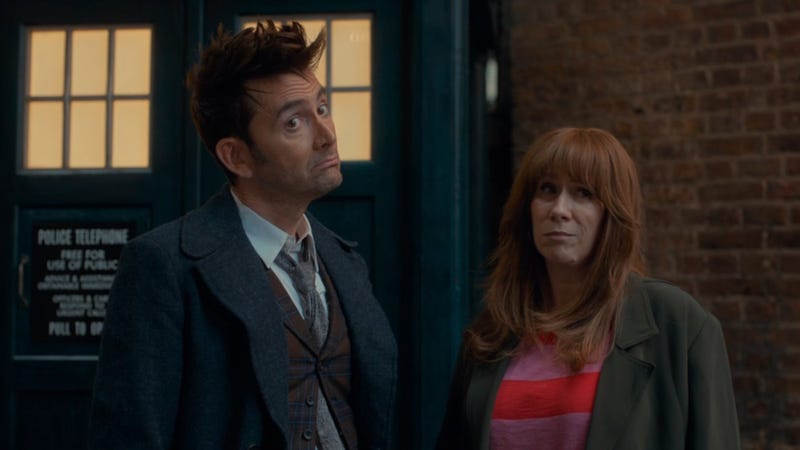
That’s the thing about anniversaries. They allow us to reflect, to look back on the past and see how it informs our present. Their lessons can inspire us to look to the future, and imagine things differently, in the light of their sentimentality. So while for now Doctor Who is partying like it’s 2008 all over again, it’s also setting the stage for a future of potentiality that’s brighter that it’s been in a very long time. A very fitting thing for a show 60 years young, ever looking ahead to what the next 60 might bring.
Want more io9 news? Check out when to expect the latest Marvel, Star Wars, and Star Trek releases, what’s next for the DC Universe on film and TV, and everything you need to know about the future of Doctor Who.
Comments
Post a Comment